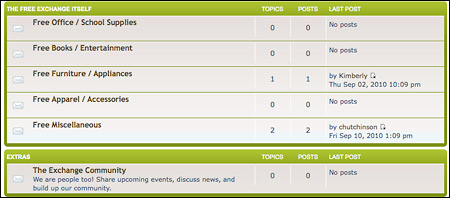Campus website gives old stuff a new life
Modeled after the Freecycle Network, the Exchange helps Berkeley community members do right by discards and go one eco-step beyond recycling.
September 14, 2010
Reusable objects deserve a second chance. That’s the thinking behind a recently launched campus website that aims to decrease waste by helping Berkeley students, faculty, staff, and departments divest of unwanted items and find things they need.
The goal of the Exchange is to motivate people to give stuff away, rather than throw it into the garbage and add to the landfill.

The Exchange website.
The Exchange is modeled after the Freecycle Network, a global nonprofit compromising more than 4,800 local groups that facilitates materials exchange. Use of the Exchange is limited to members of the campus community and requires a berkeley.edu email address to register.
The website, which went live this spring, quickly became populated with the kinds of items one might expect — bookshelves, binders, back issues of magazines, desks, moving boxes, and kitchen utensils and cookware — along with objects like a bowling ball and an old upright piano.
The Exchange is the virtual face of the campus’s ReUSE program, which hosts material-exchange stations in academic buildings and residential halls that student-volunteers keep stocked with office supplies and other materials. A list of the station locations is available on the ReUSE website. Program volunteers are also available to do pickups from departments.
“A lot of people think recycling is good enough, but it isn’t 100 percent efficient,” says Kimberly Lam, a junior majoring in environmental science in the College of Natural Resources. Lam co-manages the program with Sarah Cowan, a senior art-history major who wrote grants to secure funding for the Exchange site.
Reuse extends an item’s life cycle, says Lam. By doing so, “you reduce the amount of resources, energy, and monetary costs that would go into manufacturing and creating brand new materials.”
Using items passed along by friends or family used to be known as being frugal or thrifty, says Lam. “Now people are finally seeing that adopting the ethics of ‘reuse’ is crucial in our efforts toward building a sustainable future.”